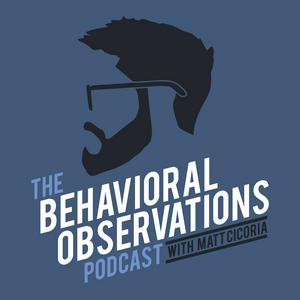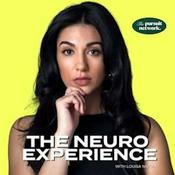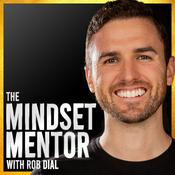The Behavioral Observations Podcast with Matt Cicoria
Matt Cicoria

Último episodio
325 episodios
Building Clinical Excellence in Autism Services: How Apollo Trains and Supports RBTs and BCBAs - Session 322
30/1/2026 | 1 h 1 minIn this episode of the Behavioral Observations Podcast, I'm joined by Kim Dean, founder of Apollo Behavior, and Kristen Vaughn, Vice President of Clinical Operations, to talk about what it really takes to build and sustain clinical excellence in autism services.
We discuss Apollo's decision to launch in Georgia, their highly selective hiring process, and how values alignment plays a central role in building their culture. Kim and Kristen share how Apollo approaches training differently — including a four-week RBT onboarding program that exceeds certification requirements and a structured mentorship model for BCBAs.
The results are notable, with 99% of Apollo's RBTs passing their exams on the first attempt! Even more impressive is that 84% of Apollo-trained BCBAs pass their exam on the first attempt too. Compared to the current average pass rate that hovers around 52-54%, that's simply amazing!
We also dig into how Apollo defines and measures clinical excellence, including the use of norm-referenced assessments, family feedback, progress toward less restrictive environments, and ongoing data analysis to improve training and service delivery.
This conversation is especially relevant for BCBAs, clinical leaders, and practice owners who are thinking seriously about how to scale services without sacrificing quality — and how to design systems that support clinicians, families, and long-term outcomes.
If this sounds like a great work environment to you, and you'd like to learn more, click here.
Related BOP Episodes:
From Clinician to Leader: Apollo CSS 8 with Kristen Vaughn
All previous Apollo Series BOP episodes
This podcast is brought to you by:
The School Behavioral Solutions for Special Educators & Behavior Analysts. The Behavior Toolbox Conference is a one-day, high-impact professional convening that brings together experienced practitioners and leaders from across education and behavior science to share what actually works in schools. Rather than relying on theory divorced from practice, this conference features presenters who actively operate within classrooms, districts, research settings, and state-level systems. Behavior analysts, educators, researchers, and system leaders come together to examine behavior change from multiple levels of impact — adult behavior, decision-making, values, and the systems that shape outcomes. It's taking place virtually through BehaviorLive on March 5th, 2026, and will be available on-demand for those who can't make it on the day of the event.
Office Puzzle: A thriving ABA practice depends on systems that actually support your team, not slow them down. If you've struggled with software that's buggy, hard to navigate, or offers little support when you need it most, you're not alone. That's why so many practices are switching to Office Puzzle. Go to officepuzzle.com/bop to learn more!
The 2026 Verbal Behavior Conference! Taking place March 26–27, 2026, in Austin, Texas, or livestream and on-demand on BehaviorLive. Presenters will include Drs. Mark Sundberg, Patrick McGreevy, Caio Miguel, Alice Shillingsburg, Sarah Frampton, Andresa De Souza, and Danielle LaFrance will share how Skinner's analysis of verbal behavior can guide the assessment and treatment of generative learning challenges in children with autism and other developmental disabilities. And don't miss the special pre-conference workshop on Wednesday, March 25.
CEUs from Behavioral Observations. Learn from your favorite podcast guests while you're commuting, walking the dog, or whatever else you do while listening to podcasts. New events are being added all the time, so check them out here.- En este episodio, Miguel conversa con María Sánchez, una profesional con un impacto notable en la formación de analistas de conducta en España y Latinoamérica. La charla gira en torno al Behavioral Skills Training (BST) o Entrenamiento de Habilidades Conductuales: qué es, cómo se aplica en la práctica y por qué sigue siendo una de las herramientas más efectivas para entrenar tanto a profesionales como a familias.
María comparte su recorrido profesional, que comienza en Inglaterra en un centro para niños con autismo y evoluciona hacia su trabajo en PECS, donde encontró su vocación inesperada en la supervisión y formación de otros profesionales. Trabajó en la capacitación de profesionales en Argentina, Uruguay, Chile, Costa Rica y España, observando de primera mano el poder transformador de la comunicación aumentativa, especialmente en niños no verbales que comienzan a desarrollar estructuras de lenguaje más complejas.
Durante la pandemia, y tras el cierre inicial en Italia, María reinventó su práctica y creó 360 Online, un proyecto de formación remota para garantizar que profesionales en regiones aisladas pudieran acceder a entrenamientos RBT e IBT de calidad. Desde entonces, ha formado a cientos de estudiantes a través de clases sincrónicas, colaboraciones con centros en Latinoamérica y sesiones a distancia altamente prácticas.
Miguel y María profundizan en el procedimiento BST —instrucciones, modelado, juego de roles y retroalimentación—, explorando cómo implementarlo eficazmente con adultos, cómo dar feedback específico sin sobrecargar, y cómo equilibrar correcciones con reconocimiento positivo. También dialogan sobre las ventajas y desafíos de entrenar a distancia, la importancia ética de proteger la privacidad de clientes y familias, la necesidad de fomentar ambientes de aprendizaje seguros y empoderadores, el rol del telehealth en la generalización de habilidades y las demandas formativas reales en España y Latinoamérica, donde muchos profesionales tienen apenas una o dos horas semanales para cumplir con las 40 horas requeridas.
Antes de cerrar, María ofrece consejos esenciales para quienes están en el campo del análisis de conducta, subrayando la importancia del trabajo en equipo, la práctica deliberada y la humildad profesional.
BOP in English: BST with María Sánchez
In this episode, Miguel speaks with María Sánchez, a professional with a remarkable impact on the training of behavior analysts across Spain and Latin America. The conversation centers on Behavioral Skills Training (BST)—what it is, how it is applied in practice, and why it remains one of the most effective tools for training both professionals and families.
María shares her professional journey, which began in England at a center for children with autism and later led her to her work with PECS, where she unexpectedly discovered her passion for supervision and professional training. She provided training to professionals in Argentina, Uruguay, Chile, Costa Rica, and Spain, witnessing firsthand the transformative power of augmentative communication, especially in nonverbal children who begin developing more complex language structures.
During the pandemic—and after the initial shutdown in Italy—María reinvented her practice and created 360 Online, a remote training project designed to ensure that professionals in isolated regions could access high-quality RBT and IBT training. Since then, she has trained hundreds of students through synchronous classes, collaborations with centers across Latin America, and highly practical remote sessions.
Miguel and María dive into the *BST procedure—instructions, modeling, role play, and feedback—*discussing how to implement it effectively with adults, how to provide specific feedback without overwhelming, and how to balance corrections with positive reinforcement. They also explore the advantages and challenges of remote training, the ethical importance of protecting client and family privacy, the need to foster safe and empowering learning environments, the role of telehealth in skill generalization, and the training demands faced in Spain and Latin America, where many practitioners have only one or two hours per week to complete the required 40 hours.
Before wrapping up, María shares essential advice for those in the field of behavior analysis, emphasizing teamwork, deliberate practice, and professional humility. The Four Leadership Hats: Applying Behavioral Science to Leadership and Supervision — Session 321 with John Guercio
15/1/2026 | 1 h 30 minIn this episode, I'm joined by John Guercio for a wide-ranging and practical conversation about leadership through a behavioral lens. John and I dig into what it actually means to lead in applied behavior analysis, especially when so much of the existing leadership literature is vague, mentalistic, or disconnected from observable behavior.
We start by talking about the need to operationalize leadership in behavioral terms and explore the four leadership hats developed by Dr. Paulie Gavoni: leading, training, coaching, and managing. We break down what each of these roles looks like behaviorally, how they function across time, and why effective leaders need to move flexibly between them rather than relying on a single style.
A major theme of the episode is the role of positive reinforcement in leadership. John shares real-world examples from his OBM coursework and his work at Cornerstone Behavioral Services, highlighting how difficult—but necessary—it can be to shift away from punitive and avoidance-based management strategies. We discuss why punishment often "works" in the short term, why leaders continue to rely on it, and how reinforcement-based leadership creates better outcomes for both staff and organizations.
We also spend time unpacking the distinction between leadership and management. John reflects on his own strengths and limitations, describing how he focuses on vision and direction while intentionally surrounding himself with strong managers who excel at systems, logistics, and follow-through. This leads to a powerful discussion about positional authority, seniority, and the myth that leadership status entitles people to treat others poorly.
Throughout the episode, we return to the importance of psychological safety, consistent feedback, and emotional regulation in leadership roles. John shares practical strategies for navigating tough conversations, including how to balance empathy with accountability, how to manage staff expectations, and how to avoid letting emotion drive professional communication (including when not to send that email).
We also talk through concrete tools and exercises for improving leadership practice, such as symbolic problem-solving activities to surface unspoken team issues, written acknowledgment systems, and using assessment tools like the Performance Diagnostic Checklist to guide supervision and coaching. John closes by sharing future directions for developing empirically grounded management assessment tools, along with a preview of his upcoming work and conference presentations.
This is a practical, honest conversation for anyone supervising staff, leading teams, or trying to build reinforcing, values-consistent organizations in human services.
Resources & Links Mentioned in This Episode
RBT Course for Adult Services (the 'bridge' course too!)
Sims and Szilagyi (1975). Leader reward behavior and subordinate satisfaction and performance
Stone Soup Conference Registration (use code PODCAST26 at checkout)
Carr and Wilder (2015). The Performance Diagnostic Checklist—Human Services
John's previous BOP appearances
Session 274: Psychological Safety in the Workplace (Supervision CEU!)
Additional Books, Articles, and Ideas Discussed
John's books on Amazon
Komaki (1998). Leadership from an Operant Perspective
McGregor (1960). The Human Side of Enterprise
Daniels and Daniels (2023). The Measure of a Leader
Elliot (2012). Leading Apple With Steve Jobs: Management Lessons From a Controversial Genius
Covey (2020). The 7 Habits of Highly Effective People, 30th Anniversary Edition
Harley (2013). How to Say Anything to Anyone
Grenny et al. (2021). Crucial Conversations (Third Edition): Tools for Talking When Stakes Are High
Sponsor shoutouts!
Office Puzzle: A thriving ABA practice depends on systems that actually support your team, not slow them down. If you've struggled with software that's buggy, hard to navigate, or offers little support when you need it most, you're not alone. That's why so many practices are switching to Office Puzzle. Go to officepuzzle.com/bop to learn more!
HRIC Recruting. Cut out the middleman and speak directly with Barbara Voss, who's been placing BCBAs in great jobs all across the US for 15 years.
The 2026 Stone Soup Conference! This is one of the best values in the online conference space. I'm actually going to be one of the speakers at this year's event, along with a great cast of other characters you're probably familiar with. Save on your registration by using promo code PODCAST26
Behavior University. Their mission is to provide university quality professional development for the busy Behavior Analyst. Learn about their CEU offerings, including their 8-hour Supervision Course, as well as their RBT offerings over at behavioruniversity.com/observations. Don't forget to use the coupon code, PODCAST to save at checkout!
The 2026 Verbal Behavior Conference! Taking place March 26–27, 2026, in Austin, Texas, or livestream and on-demand on BehaviorLive. Presenters will include Drs. Mark Sundberg, Patrick McGreevy, Caio Miguel, Alice Shillingsburg, Sarah Frampton, Andresa De Souza, and Danielle LaFrance will share how Skinner's analysis of verbal behavior can guide the assessment and treatment of generative learning challenges in children with autism and other developmental disabilities. And don't miss the special pre-conference workshop on Wednesday, March 25.
CEUs from Behavioral Observations. Learn from your favorite podcast guests while you're commuting, walking the dog, or whatever else you do while listening to podcasts. New events are being added all the time, so check them out here.The Importance of Hard and Soft Skills in ABA Practice: Session 320 with Tiffany Kodak and Landon Cowan
07/1/2026 | 1 h 14 minIn Session 320, I sit down with Landon Cowan and Tiffany Kodak to talk about an area of behavior analysis that doesn't get nearly enough attention: professional (or "soft") skills.
We spend a lot of time in our field teaching and refining technical, clinical, or "hard" skills—and for good reason. But far less time is devoted to the interpersonal, communication, and problem-solving skills that ultimately determine how effective we are as clinicians, supervisors, and collaborators. In this conversation, Landon and Tiffany share their research aimed at identifying, defining, and measuring these professional skills, along with some eye-opening findings about where skill gaps exist.
🔍 What We Cover in This Episode
How hard skills differ from professional (soft) skills in behavior analysis
Why professional skills are so difficult to define, measure, and systematically teach
How Landon and Tiffany developed a comprehensive professional skills survey for behavior analysts
The challenges of survey design, including question format, length, readability, and pilot testing
Results from a survey completed by 189 ABA supervisors, including:
Which skills supervisees demonstrate most frequently
Which skills supervisors rate as most important for career advancement
A significant gap between the importance of problem-solving skills and how often they're actually demonstrated
Why solution-based problem identification and independent problem solving emerged as key areas for improvement
A surprising finding that many supervisors report feeling confident teaching these skills despite identifying major skill deficits
How Behavioral Skills Training (BST) can be used to effectively teach professional skills
Why the field needs clearer operational definitions and better data collection to build a stronger literature base
Practical advice for BCBA trainees and early-career BCBAs around self-assessment, feedback, and ongoing professional development
🎯 Key Takeaways
This episode reinforces something many of us already suspect: professional skills matter—a lot. In many cases, they're just as important (if not more important) than technical expertise when it comes to supervision, leadership, and long-term success in the field. Developing these skills requires intentional training, honest self-reflection, and a commitment to continuous learning. My hope is that this conversation helps push our field toward doing a better job of teaching, measuring, and valuing the skills that make behavior analysts more effective in the real world.
Resources and Links
Dr. Kodak's faculty page at Marquette University.
Dr. Cowan's LinkedIn page.
Cowan and Kodak (2024). Professional Skills for Behavior Analysts: A Survey on the Proficiency and Importance of Hard and Soft Skills.
LeBlanc, Taylor, and Marchese (2019). The Training Experiences of Behavior Analysts: Compassionate Care and Therapeutic Relationships with Caregivers.
Taylor, LeBlanc, and Nosik (2018). Compassionate Care in Behavior Analytic Treatment: Can Outcomes be Enhanced by Attending to Relationships with Caregivers?
The Stone Soup Conference (use promo code PODCAST26 to save at registration).
Sommers-Flanagan and Sommers-Flanagan (2023). Clinical Interviewing.
Carroll, Preas, and Paden (2022). Training supervisors to provide performance feedback using video modeling with voiceover instructions: A replication.
Sponsor shoutouts!
Office Puzzle: A thriving ABA practice depends on systems that actually support your team, not slow them down. If you've struggled with software that's buggy, hard to navigate, or offers little support when you need it most, you're not alone. That's why so many practices are switching to Office Puzzle. Go to officepuzzle.com/bop to learn more!
Frontera. Consider taking a demo of Frontera's Assessment Builder and see how the ethical application of AI technologies can help you serve clients and save you time! Your first assessment report is free. And if you use code BOP25 you'll get an additional five assessments for just $100. So head to fronterahealth.com to check it out!
The 2026 Stone Soup Conference! This is one of the best values in the online conference space. I'm actually going to be one of the speakers at this year's event, along with a great cast of other characters you're probably familiar with. Save on your registration by using promo code PODCAST26!
The 2026 Verbal Behavior Conference! Taking place March 26–27, 2026, in Austin, Texas, or livestream and on-demand on BehaviorLive. Presenters will include Drs. Mark Sundberg, Patrick McGreevy, Caio Miguel, Alice Shillingsburg, Sarah Frampton, Andresa De Souza, and Danielle LaFrance will share how Skinner's analysis of verbal behavior can guide the assessment and treatment of generative learning challenges in children with autism and other developmental disabilities. And don't miss the special pre-conference workshop on Wednesday, March 25.
CEUs from Behavioral Observations. Learn from your favorite podcast guests while you're commuting, walking the dog, or whatever else you do while listening to podcasts. New events are being added all the time, so check them out here.- Don't adjust your podcast player folks, you have the right show. Welcome to Session 319 of the Behavioral Observations Podcast. If you've been listening for a bit, you know what's coming. If you're new to the show however, first, welcome and thanks for listening.
Every year, I team up with my friends from the ABA Inside Track Podcast to do a Year In Review episode. We've tinkered with the format over time, but for this one, we talk briefly about the trends and issues that we thought were important in 2025. From there, we discussed some of the most downloaded shows from our podcasts this year and speculate as to why these ones resonated so much.
We close the show talking about how both of our shows are turning 10 years old very soon. So we look back on what we've learned over a decade of podcasting!
Today's episode is brought to you by,
· Frontera. Consider taking a demo of Frontera's Assessment Builder and see how the ethical application of AI technologies can help you serve clients and save you time! Your first assessment report is free. And if you use code BOP25 you'll get an additional five assessments for just $100. So head to fronterahealth.com to check it out!
· HRIC Recruting. Cut out the middleman and speak directly with Barbara Voss, who's been placing BCBAs in great jobs all across the US for 15 years.
· The 2026 Stone Soup Conference! This is one of the best values in the online conference space. I'm actually going to be one of the speakers at this year's event, along with a great cast of other characters you're probably familiar with. Save on your registration by using promo code PODCAST26!
· Behavior University. Their mission is to provide university quality professional development for the busy Behavior Analyst. Learn about their CEU offerings, including their 8-hour Supervision Course, as well as their RBT offerings over at behavioruniversity.com/observations. Don't forget to use the coupon code, PODCAST to save at checkout!
Más podcasts de Salud y forma física
Podcasts a la moda de Salud y forma física
Acerca de The Behavioral Observations Podcast with Matt Cicoria
The Behavioral Observations Podcast with Matt Cicoria is an interview-based show that features conversations with innovative scientists and practitioners in the field of Behavior Analysis. The podcast covers topics such as Autism, Functional Behavioral Assessment, Acceptance and Commitment Therapy, Functional Communication Training, Verbal Behavior, and more!
Sitio web del podcastEscucha The Behavioral Observations Podcast with Matt Cicoria, Las 3 R's y muchos más podcasts de todo el mundo con la aplicación de radio.net

Descarga la app gratuita: radio.net
- Añadir radios y podcasts a favoritos
- Transmisión por Wi-Fi y Bluetooth
- Carplay & Android Auto compatible
- Muchas otras funciones de la app
Descarga la app gratuita: radio.net
- Añadir radios y podcasts a favoritos
- Transmisión por Wi-Fi y Bluetooth
- Carplay & Android Auto compatible
- Muchas otras funciones de la app


The Behavioral Observations Podcast with Matt Cicoria
Escanea el código,
Descarga la app,
Escucha.
Descarga la app,
Escucha.







































